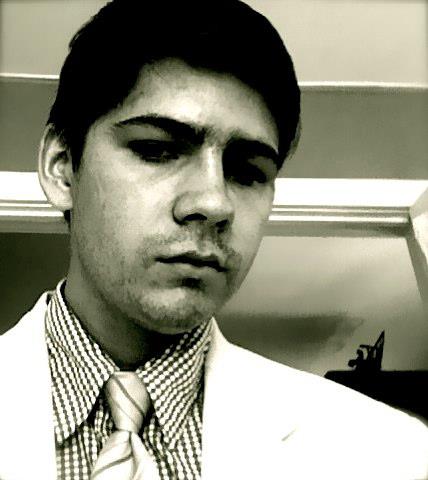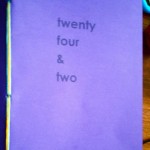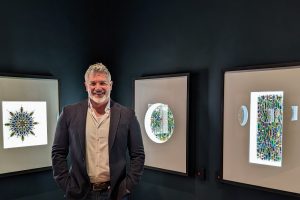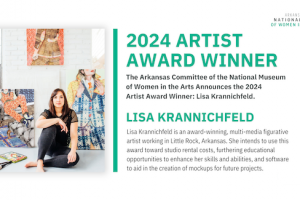Martin Bemberg chats about his new poetry collection “Twenty Four & Two”

By Kody Ford
Editor
Martin Bemberg is a 21st century Renaissance man. A prolific poet, musician and songwriter, he has recorded several albums and served as the front man for the band Memphis Pencils from 2007 to 2011, which released two albums and won two Northwest Arkansas Music Awards. He has also released two solo albums under the name Bartin Memberg. Recently, he moved back from Austin, TX, with his new bride Kristin and has re-enrolled at the University of Arkansas to study foreign languages. That can keep a man busy. Whether he spends his free time drafting plans for human flying machines and shoes that can walk on water remains to be seen.
But Bemberg has compiled a collection of poetry called Twenty-Four & Two, which featuring vivid imagery, clever wordplay and wry humor. He plans to hold on a reading (with Sabine Schmidt) and book release at Nightbird Books on Sept. 15 at 7 P.M. his latest band, Spouse Set, will make their debut performance. The Idle Class recently chatted with Bemberg about his work.
Tell me about Twenty-four & Two. What made you decide to put it out?
Martin: Well, I guess it really just starts with this kind of annoying tendency of mine to want to share everything I do with everyone I know. But in practical terms, it’s easier to spread your work if you’ve got a physical copy.
And when I realized I’d completed enough work to put a little book together, it was around the time that I finished this ridiculously hard, intensive Latin class (taught by my favorite professor, Dr. Daniel Levine), and I didn’t really have anything to do. So for like two weeks straight I dedicated myself to figuring out how to make a book I could put out.
 And you’re self-printing and binding them?
And you’re self-printing and binding them?
Martin: Well, Kinko’s is my press. But I bind them myself.
Are there any common themes in the poems?
Martin: Let me think. Obviously there’s love, but it’s more than that. There’s a lot of content about seasons as I recall. One-on-one relationships are really important to my poetry, I think. I don’t know…other themes…just kind of a celebration of the quotidian, the mundane, the every day. The run of the mill is more interesting to me than abstract concepts like the nature of existence or politics or anything like that. There’s a lot more beauty, I think, in observing the would-be boring things in your life and finding some kind of ritual, or even ceremony, within them.
Like in “Life Without The Internet” I imply that cheap wine and listening to old vinyl albums is more powerful than Beethoven or the fall of the Berlin Wall. Which in the grand scheme of things is probably not true, but for me, I’m more moved by questions like “Why do these fucking flies keep landing in my wine?”
An example of the mundane being described as something loftier… In “Anna Beth Aquarius” I refer to songs as hymns. In “Brushing Teeth, I Thank The Distance” I imply an expectation that somehow brushing my teeth on the toilet, changing up the bedtime routine, would be something cathartic and not just some boring detail, a change in daily patterns that might get my mind off of lost love. If that makes any sense. I think the best example is “I Count My Blessings.
What got you into poetry in the first place?
Martin: Hmmm… A girl that’s been pretty important in my life introduced me to Billy Collins back in 2007. It started because we were talking about our favorite parts of Nabokov’s Lolita. We both agreed it was where his description of Lolita’s mother’s death was in brackets – [picnic, lightning].
And so then she showed me some animated poetry. I was really blown away when I listened to him read “The Dead.” Billy Collins that is. And it wasn’t really until 2010 when I took John DuVal’s poetry class at the U of A that I started to take poetry really seriously.
I was blown away again by Dylan Thomas’s “Fern Hill” – the description of a rural childhood reminded me so much of the highs of my past manic episodes. But really, when I decided I wanted to write poetry and take it seriously was when I read Theodore Roethke.
I never liked blank verse, I’ve never preferred strict rhyming patterns except in certain forms, like sonnets (and terza rims is really badass too). I guess sestinas are really neat, but mostly because they’re such a challenge.
Roethke was the first poet I read and heard that did meter and rhyme right. His work is all very musical and you never know when the rhymes will come. Sometimes it’s a couplet to end a stanza, sometimes it’s this beautifully timed internal rhyme (I think that’s what it’s called). And also, he wrote a lot about love. Ask anyone of my friends and they’ll tell you I’ve been in love with someone or another my whole life. But with Roethke, it was like, ”Man, this guy’s a musician with words.”
What was your first poem?
Martin: I wrote one when I was like 14 or 15 about religious tolerance. I was really into being a Unitarian back then. It was some sort of limerick or silly form like that. I don’t remember what it felt like to write it – the process, I mean. But it felt real good when someone’s mother told me it was really good.
My [first new poem] was “If You Asked Me For A Poem, I’d Say.” I’m trying to remember what made me want to write it. But essentially, I was hungover and couldn’t hold a pen steady, so I typed it out, and the poem started off about that and ended up being a kind of love poem questioning the value of love poetry.
How did it feel to write that one?
Martin: Man, I go into this trance when I write. I don’t eat or sleep or even stop writing when I’m smoking a cigarette. So it really feels like…I don’t know…just pure creation. It’s labor, you know? Kind of like constructing a house, kind of like giving birth. Except not as strenuous as either. But the thing is…When I realized I had gone into that trance when I was writing that first legitimate poem, I thought, “Hey, this is what writing music or recording it or performing it feels like.” And when I realized the feelings of elation of labor were similar between poetry and music I felt I could do more.
You seem to write a lot of love poems. Is this the case?
Martin: This is true. Since I only started writing poetry about two years ago – and it happened to be for a distant lady – love seemed like the right place the start.
Not that I intended to focus on love. But it’s where a lot of art begins, and for me it’s easy to express with more creative language than other topics. It’s just such a broad category and it’s something that everyone feels and knows about. I wonder sometimes whether people are sick of love poems though. You don’t see a lot in The New Yorker or other publications, and maybe it’s passé now. But whatever. Love rules.
But I guess the stuff I’m working on now is more humor-based, kind of trying to pick apart the mundane. I’ve been in such a preparation haze the last day or two that it’s hard for me to even recall what I’ve written. Well, actually there’s this one where I used as many Beatles song titles as possible to construct complete sentences. It ended up being kind of a love poem, but it was probably the most fun to write because it was like putting a puzzle together.
To read more poetry by Martin Bemberg visit his blog “Plumbum Verse.”




1 comment